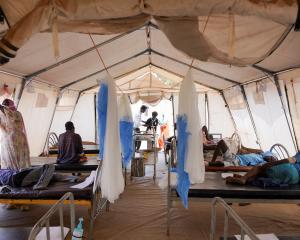Voting began last week to choose the problem the winner of the Longitude Prize 2014 will have to solve - and win 10 million ($NZ20 million).
It's a publicity gimmick, of course, but it may be very useful nevertheless. Specially because, unlike most of these prizes for innovation, it is meant to solve a problem that is of concern to all of humanity.
The Darpa Challenges are all about autonomous vehicles and robots, mostly with military applications. The Ansari X Prize was for a low-cost reusable spacecraft capable of sub-orbital flight, and the follow-on Google Lunar X Prize is more of the same. Toys for the boys.
The $10 million Tricorder X Prize, announced in 2012, is a bit closer to the mark, as it would reward the development of an instant diagnostic device like the one used by Leonard ''Bones'' McCoy, the chief medical officer in the original Star Trek series. But the Longitude 2014 Prize is the real deal.
It marks the 300th anniversary of the first Longitude Prize, when the British Parliament offered 20,000 (a sum comparable to 10 million now) to anyone who could devise a method for finding a ship's position at sea.
Latitude - its distance north or south of the equator - could easily be found by measuring the height of the Sun or the Pole Star above the horizon, but there was no good way of determining its east-west position: its longitude.
Instead, mariners relied on ''dead reckoning''. They kept track of what courses they steered, how fast they were going, and for how long, and added it all together to come up with a rough estimate of how far they had travelled east or west. But they could not accurately calculate the effect of ocean currents and winds on their position, and the ships often tacked to and fro.
After an ocean crossing, navigators were often wrong about their ship's position by hundred of miles: landfall might occur with no warning, and quite possibly at night. Worldwide, hundreds of ships were being lost each year, and so in 1714 the Longitude Prize was created.
The solution was obvious in principle. You just set your clock at noon at your port of departure, note the time it reads when the sun is highest wherever you are, and the difference between noon on the clock and noon at your present position will tell you your longitude.
But your clock must stay accurate during long sea voyages. They had good pendulum clocks in the 18th century, but pendulums didn't work very well on a rolling, pitching ship.
It took a long time to build a chronometer that stayed accurate enough (gaining or losing only a few seconds per month) to let mariners calculate their longitude to within one or two nautical miles. But by 1765, John Harrison, a clockmaker from Lincolnshire, had done the job.
He died a rich man, and he deserved his reward: thousands of ships were saved from shipwreck and hundreds of thousands of lives were spared in the century that followed.
The new Longitude Prize is all about saving human life (or improving it) on a large scale. There are six ''challenges'' on the Longitude committee's list, and only one of them will be chosen for the prize. They are: Flight - How can we fly without damaging the environment? Food - How can we ensure everyone has nutritious sustainable food?
Antibiotics - How can we prevent the rise of resistance to antibiotics? Paralysis - How can we restore movement to those with paralysis?
Water - How can we ensure everyone has access to safe and clean water? Dementia - How can we help people with dementia live independently for longer?
Consider the Antibiotics challenge, for example: ''Clinicians often prescribe broad spectrum antibiotics to sick patients because doctors have to act quickly on imperfect information. These methods put selective pressure on microbes to evolve resistance to antibiotics ...
''The challenge ... will be to create a cheap, accurate, rapid, and easy-to-use test for bacterial infections that will allow doctors and nurses all over the world to better target their treatments, administering the right antibiotics at the right time.''
As BBC director-general Tony Hall said when the prize was announced: ''There might be another modern-day John Harrison somewhere out there ... and they may not even know that they're a scientist.''
The voting to decide which challenge gets the nod opened on May 22 on the BBC Horizon website, and closes on 25 June. Unfortunately, voting is restricted to British residents, but the prize is open to everybody in the world.
And maybe there are five other governments out there that would like to put up $10 or $20 million for a solution to one of the other five challenges.
Gwynne Dyer is an independent London journalist.












